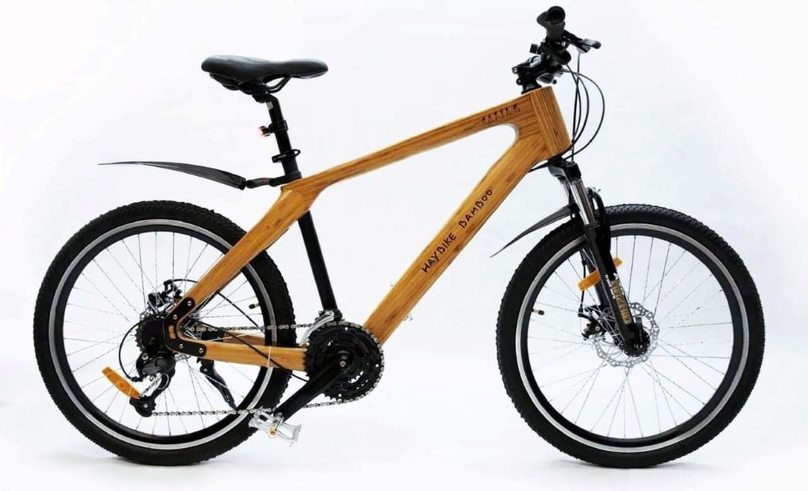Haybike’s bamboo e-bicycles win wider acceptance
Vietnamese electric bicycle maker Haybike is seeking to make inroads into the niche market as more and more people prefer cycling as a green living trend. The Investor talks with Haybike CEO Nguyen Van Tuyen about his company's endeavor in its pursuit.

The market already has many established electric bicycle brands like Giant, Panasonic, and Yamaha PAS. What makes Haybike any different?
Competing with big brands is tough because Giant, Panasonic, Yamaha and others have many years of experience and utilize high technology. A great deal of money is required, for both technology and marketing, not to mention patience in achieving a break-even point. Therefore, we have followed our own path.
Bamboo is a very typical Vietnamese material, and can be exploited in large amounts. It is strong, durable, flexible and hard. It is cheap but as hard as steel, and more flexible than steel. Haybike uses bamboo to make e-bikes while other brands do not.
We put Vietnamese emotion and soul into our bamboo products, which are cheaper on the domestic market than some imported equivalents.
Design is also extremely important, which we align with Vietnamese preferences. We use software to determine the height of an e-bike, seating position, body length and size, age, and if a customer is male or female, etc.
Haybike was born in Vietnam and understands the Vietnamese market well. That’s how Haybike is able to create different experiences. Our customers are also spreading our message of green living, environmental protection and social responsibility.
For any manufacturer, it is not possible to guarantee 100% error-free products. Our customer care solutions are aimed at any problems that may occur.
Using bamboo might raise concerns over product safety. How would you address this?
We have succeeded in ensuring product safety in using the friendly and renewable material. Bamboo is an organic material, not metal. Technical solutions are required to deal with bamboo-related problems like decay, or weathering. It is a relatively complicated process, but Haybike has solved these problems to create durable products.
The product life cycle of Haybike is 12 years. Under favorable weather conditions, durability could reach 20 years. However, 12 years is our benchmark and could be considered a long life cycle for a bicycle.

A Haybike product. Photo courtesy of the company.
Petrol prices are on the rise, and more and more Vietnamese are growing aware of eco-friendly living. Do you see this as an advantage for e-bike producers?
Generally speaking, people in Vietnam and worldwide are becoming more eco-friendly. Cycling is getting more popular in Europe, which used to depend on cars. Currently, the Netherlands population is about 17 million, with 23 million bicycles in use.
Vietnam is also in the process of development and will reach the peak of bicycles by 2030. After two years of Covid-19 outbreaks, cycling has expanded very quickly. Bicycle producers in Vietnam and all over the world have recently experienced supply shortages, with higher production capacities required.
Our own forecast for the Vietnamese market peak is 2025 instead of 2030. We also expect sustainable growth to follow.
Regarding bamboo, we think using it to make bicycles could create greater value compared to other products.
As for increasing petrol prices worldwide, I see electric cars, cycling and public transport as alternatives to deal with the problem.
What is the biggest challenge you’ve faced in developing Haybike?
During the two-year pandemic, despite high market demand, the supply chain of materials and spare parts was broken in Vietnam and Europe, causing production disruptions and sales decrease.
Your products are already available in the EU and North America. Please tell us about your experience in penetrating these markets?
When approaching overseas markets, we faced many challenges due to the higher demand for quality products.
We signed a sponsorship contract with the Heerenveen football club in the Netherlands for them to use our bamboo bike. It was one of our initial steps into Europe.
Customers in these markets are very practical, extremely specific, and are strict on requirements. If we failed to pay attention we could face costly legal issues. We are fortunate to have partners that understand the European market well.
What are your forecast on the electric bicycle markets in Vietnam and Southeast Asia?
Post-pandemic demand in Vietnam and the region is increasing dramatically. According to our research, the domestic market has reached VND7,500 billion (over $320 million) and growing at an average of 30% per year. The Southeast Asian market is larger in size and similar in growth.
What could foreign businesses achieve by partnering with Haybike?
Haybike wishes to team up with reputable and potential partners in foreign countries. Together, we can create more products of higher quality. Partnerships could help us supply the overseas market, including with production technology.
- Read More
Maersk eyes building major container ports in Vietnam
A.P.Moller - Maersk (Maersk) is exploring investment opportunities to develop large, modern and low-carbon container ports in Vietnam.
Infrastructure - Wed, November 19, 2025 | 4:36 pm GMT+7
Taiwan semiconductor giant Panjit acquires 95% of Japan-based Torex’s Vietnam arm
Panjit International Inc, a Taiwan-listed semiconductor major, has approved the acquisition of a 95% stake in Torex Vietnam Semiconductor, a subsidiary of Japan-based Torex.
Companies - Wed, November 19, 2025 | 3:59 pm GMT+7
Vietnam PM urges Kuwait Petroleum to expand Nghi Son refinery, build bonded fuel storage facility
Prime Minister Pham Minh Chinh on Tuesday called on Kuwait Petroleum Corporation (KPC) to expand the Nghi Son oil refinery and build a bonded fuel storage facility in Vietnam.
Industries - Wed, November 19, 2025 | 3:18 pm GMT+7
Southern Vietnam port establishes strategic partnership with Japan’s Port of Kobe
Long An International Port in Vietnam’s southern province of Tay Ninh and Japan’s Port of Kobe on Monday signed an MoU establishing a strategic port partnership which is expected to boost trade flows, cut logistics costs, and deliver greater benefits to businesses across the region.
Companies - Wed, November 19, 2025 | 10:14 am GMT+7
Thaco's agri arm seeks to expand $44 mln cattle project in central Vietnam
Truong Hai Agriculture JSC (Thaco Agri), the agriculture arm of conglomerate Thaco, looks to aggressively expand its flagship cattle farming project in the central Vietnam province of Gia Lai.
Industries - Wed, November 19, 2025 | 9:56 am GMT+7
Japan food major Acecook eyes new plant in southern Vietnam
Acecook, a leading instant noodle maker with 13 plants operating in Vietnam, is studying a new project in the southern province of Tay Ninh.
Industries - Wed, November 19, 2025 | 9:39 am GMT+7
Vietnam’s largest Aeon Mall to take shape in Dong Nai province
Authorities of Dong Nai province, a manufacturing hub in southern Vietnam, on Monday awarded an investment registration certificate to Japanese-invested Aeon Mall Vietnam Co., Ltd. for its Aeon Mall Bien Hoa project.
Industries - Tue, November 18, 2025 | 8:17 pm GMT+7
Police propose prosecuting Egroup CEO Nguyen Ngoc Thuy for fraud, bribery
Vietnam’s Ministry of Public Security has proposed prosecuting Nguyen Ngoc Thuy, chairman and CEO of Hanoi-based education group Egroup, along with 28 others, for fraud to appropriate property, giving bribes, and receiving bribes.
Society - Tue, November 18, 2025 | 4:01 pm GMT+7
Singapore-backed VSIP eyes large urban-industrial complex in southern Vietnam
A consortium involving VSIP, a joint venture between local developer Becamex IDC and Singapore’s Sembcorp, plans a large-scale urban-industrial development named the "Moc Bai Xuyen A complex along the Tay Ninh-Binh Duong economic corridor in southern Vietnam.
Industrial real estate - Tue, November 18, 2025 | 2:38 pm GMT+7
Aircraft maintenance giant Haeco to set up $360 mln complex in northern Vietnam
Hong Kong-based Haeco Group, Vietnam's Sun Group, and some other partners plan to invest $360 million in an aircraft maintenance, repair and overhaul (MRO) complex at Van Don International Airport in Quang Ninh province - home to UNESCO-recognized natural heritage site Ha Long Bay.
Industries - Tue, November 18, 2025 | 2:13 pm GMT+7
Thai firm opens 20,000-sqm shopping center in central Vietnam hub
MM Mega Market Vietnam (MMVN), a subsidiary of Thailand's TCC Group, on Monday opened its MM Supercenter Danang, a 20,000 sqm commercial complex with total investment capital of $20 million, in Danang city.
Real Estate - Tue, November 18, 2025 | 12:20 pm GMT+7
Vietnam PM asks Kuwait fund to expand investment in manufacturing, logistics, renewable energy
Prime Minister Pham Minh Chinh on Monday called on the Kuwait Fund for Arab Economic Development (KFAED) to strengthen cooperation with Vietnam, particularly in the areas of industrial production, logistics, renewable energy, green economy, and the Halal ecosystem.
Economy - Tue, November 18, 2025 | 11:53 am GMT+7
Thai dairy brand Betagen to build first plant in Vietnam
Betagen, a famous Thai dairy brand, plans to build its first manufacturing plant in Vietnam, located in the southern province of Dong Nai.
Industries - Tue, November 18, 2025 | 8:49 am GMT+7
Banks dominate Vietnam's Q3 earnings season, Novaland posts biggest loss
Banks accounted for more than half of the 20 most profitable listed companies in Vietnam’s Q3/2025 earnings season, while property developer Novaland recorded the largest loss.
Finance - Tue, November 18, 2025 | 8:24 am GMT+7
Highlands Coffee posts strongest quarterly earnings in 2 years on robust same-store sales
Highlands Coffee, Vietnam’s largest coffee chain, delivered its best quarterly performance in two years, with Q3 EBITDA exceeding PHP666 million ($11.27 million), parent company Jollibee Foods Corporation (JFC) said in its latest earnings report.
Companies - Mon, November 17, 2025 | 10:21 pm GMT+7
Hong Kong firm Dynamic Invest Group acquires 5% stake in Vingroup-backed VinEnergo
VinEnergo, an energy company backed by Vingroup chairman Pham Nhat Vuong, has added a new foreign shareholder after Hong Kong–based Dynamic Invest Group Ltd. acquired a 5% stake, according to a regulatory filing on Saturday.
Companies - Mon, November 17, 2025 | 9:52 pm GMT+7
























